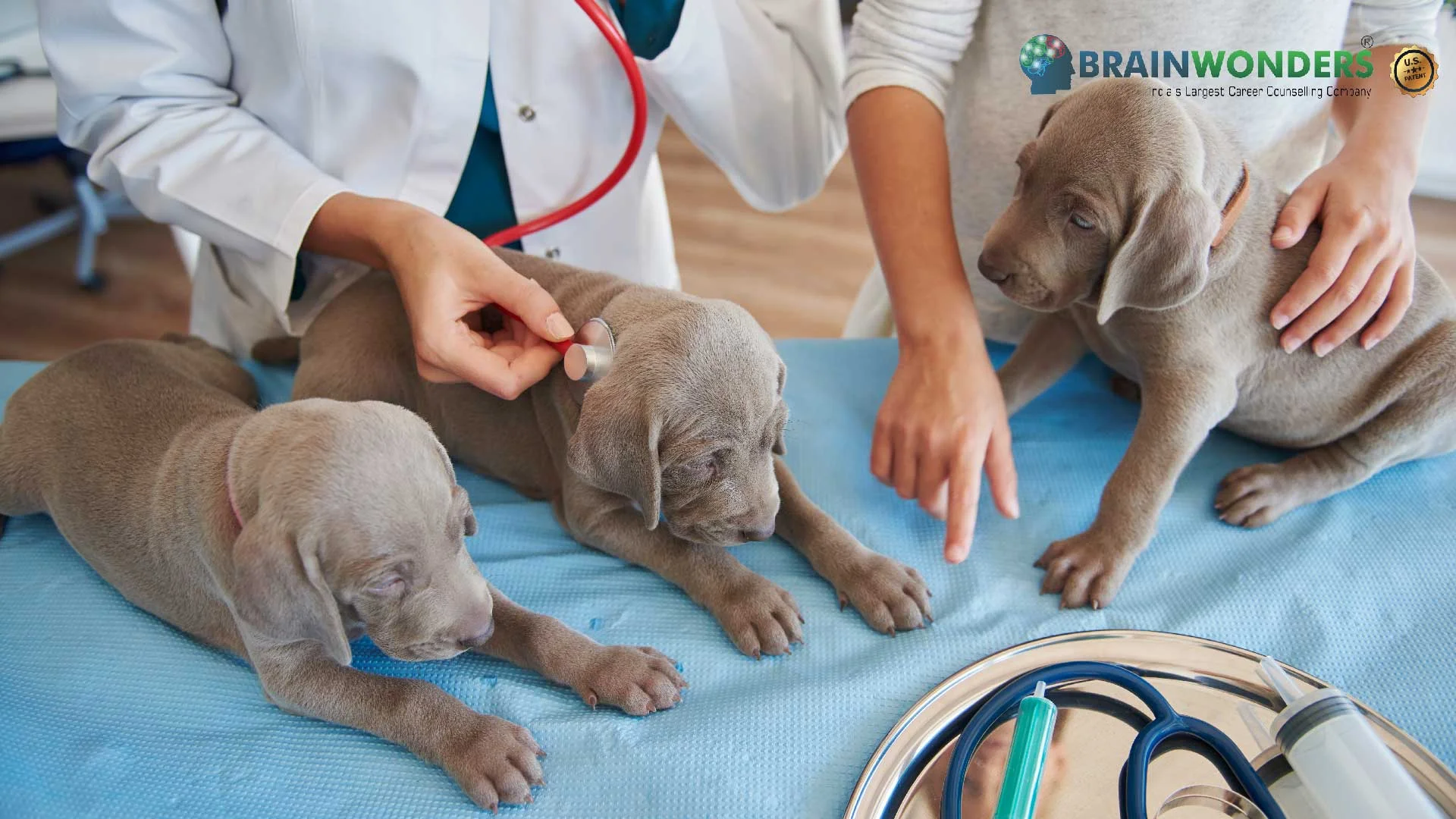How to become a Veterinary Technologist
Overview, Courses, Exam, Colleges, Pathways, Salary

Overview
Who is Veterinary Technologist ?
It can be said that veterinary technologists or vet techs are the silent heroes of animals; providing nursing care, emergency first aid, running various tests, administering anaesthesia, looking for signs of pain, cleaning animals’ teeth and so on. Veterinary technologists are trained professionals who assist veterinarians to diagnose illnesses and injuries of animals by assuming many technical duties and caring for the patients. They are responsible for performing various medical tests under the supervision of a veterinarian such as Radiology, Necropsy, Surgical Assisting, Anesthesia, Patient Care, Clinical Pathology and so on. Veterinary technologist jobs can get physically as well as emotionally demanding. It requires dealing with abused animals, and/or may have to help euthanize critically sick animals. Sometimes, work night shifts, weekends and even holidays. Being a vet tech, one can expect to be employed at private clinics, animal hospitals, laboratories, colleges and universities.
Typical day at work
What does Veterinary Technologist do?
Veterinary technologist job description comprises of the following tasks:
- Examine the behaviour of animals to diagnose their condition
- Provide emergency first aid or nursing care to injured animals
- Collect laboratory samples such as tissue, blood, urine or testing
- Perform laboratory tests
- Take x-rays and develop them for analysis
- Document patients’ history
- Prepare instruments and animals for surgery
- Administer the right amount of anaesthesia to the animals and observe their behaviour
- Administer the medication, vaccines and treatments prescribed by the veterinarian
Abilities and Aptitude needed
What are the skills, abilities & aptitude needed to become Veterinary Technologist?
In order to excel in any field, aspirants must possess certain attributes that complement the job role. In a similar fashion, veterinary technologists must be investigative, intellectual, introspective, analytical, practical, persistent and methodical. Veterinary technologists must possess manual dexterity to cater to the animal’s needs with care and a steady hand. Besides, veterinary technologists must possess strong communication skills, problem-solving skills. Most importantly, veterinary technologists must be patient, empathetic individuals who are passionate about animals and their welfare and treat them with kindness and sensitivity.
Pathways
How to become an Veterinary Technologist?
Entrance Exam
Entrance Exam for Veterinary Technologist ?
Courses
Which course I can pursue?
Best Colleges
Which are the best colleges to attend to become an Veterinary Technologist?
Industries
Which Industries are open for Veterinary Technologist?
Veterinary technologists can find opportunities in various industries involving animal care and treatment. Here are some industries that are open for veterinary technologists:
- Veterinary Practices and Animal Hospitals: The primary industry for veterinary technologists is working in veterinary practices and animal hospitals. They assist veterinarians in providing medical care, conducting laboratory tests, administering medications, and assisting in surgical procedures for various animals, including companion animals, livestock, and exotic species.
- Research and Biotechnology: Veterinary technologists can work in research institutions, pharmaceutical companies, and biotechnology firms focusing on animal research and developing veterinary drugs or medical devices. They contribute to laboratory experiments, data collection, sample analysis, and monitoring the health and well-being of research animals.
- Zoos and Wildlife Sanctuaries: Zoos, wildlife sanctuaries, and conservation organizations employ veterinary technologists to assist with caring for and managing captive wildlife species. They participate in health examinations, administer treatments, assist in surgeries, and provide general medical support for the well-being of the animals.
- Animal Rehabilitation and Physical Therapy: Veterinary technologists can work in rehabilitation centers or facilities that offer physical therapy and rehabilitation services for animals. They assist in providing therapeutic exercises, hydrotherapy, and other modalities to aid in the recovery and mobility of animals with injuries or conditions.
- Animal Control and Shelters: Veterinary technologists can work in animal control agencies or animal shelters, providing medical care and vaccinations and assisting with spaying/neutering procedures for stray animals. They also play a role in disease prevention, population control, and promoting animal welfare.
- Livestock and Production Animal Industry: In the livestock and production animal industry, veterinary technologists can work on farms, ranches, or agricultural facilities. They assist with herd health management, reproductive procedures, vaccinations, and general medical care for livestock and production animals.
- Veterinary Diagnostic Laboratories: Veterinary technologists can work in diagnostic laboratories that specialize in animal health. They perform laboratory tests, analyze samples, and assist in diagnosing diseases or conditions in animals.
- Veterinary Education and Training: Veterinary technologists can work in educational institutions that offer veterinary technology programs. They can serve as instructors, clinical educators, or laboratory technicians, providing hands-on training and support to veterinary technology students.
internship
Are there internships available for Veterinary Technologist?
Yes, internships for veterinary technologists are available in various settings, offering valuable opportunities to gain practical experience and further develop their skills in the field. Here are a few avenues to explore:
- Veterinary Practices and Animal Hospitals: Many veterinary practices and animal hospitals offer internship programs for veterinary technologists. These internships provide hands-on experience in assisting veterinarians, conducting laboratory tests, administering medications, and performing various medical procedures on various animals.
- Research Institutions and Biotechnology Companies: Research institutions and biotechnology companies involved in animal research may offer internships for veterinary technologists. Interns can gain experience in laboratory techniques, data collection, research animal care, and contribute to ongoing research projects.
- Zoos, Wildlife Sanctuaries, and Conservation Organizations: Zoos, wildlife sanctuaries, and conservation organizations often have internship programs for veterinary technologists. Interns can participate in the medical care, farming, and welfare of various animal species, including exotic and endangered species.
- Animal Rehabilitation and Physical Therapy Centers: Interning at animal and physical therapy centers can provide valuable experience assisting with rehabilitation exercises, hydrotherapy, and other therapeutic modalities. Interns can contribute to caring for and recovering animals with injuries or conditions.
- Animal Control Agencies and Shelters: Animal control agencies and animal shelters may offer internships for veterinary technologists to assist with medical care, vaccinations, and spaying/neutering procedures for stray or shelter animals. Interns can gain experience in population management, disease prevention, and general animal welfare.
- Veterinary Diagnostic Laboratories: Veterinary diagnostic laboratories occasionally offer internships for veterinary technologists. Interns can gain experience performing laboratory tests, analyzing samples, and contributing to diagnosing animal diseases or conditions.
Career outlook
What does the future look like for Veterinary Technologist?
The demand for veterinary technologist jobs are expected to witness a surge as veterinarians perform more specialised tasks and clinics and hospitals require highly trained professionals to provide general care and perform laboratory work. Safe to say, employment opportunities are promising for veterinary technologists especially in rural areas. Besides, veterinary technologists get the satisfaction of contributing to the welfare of animals. It is a rewarding and challenging career for individuals who are passionate about working with animals.


.webp)


